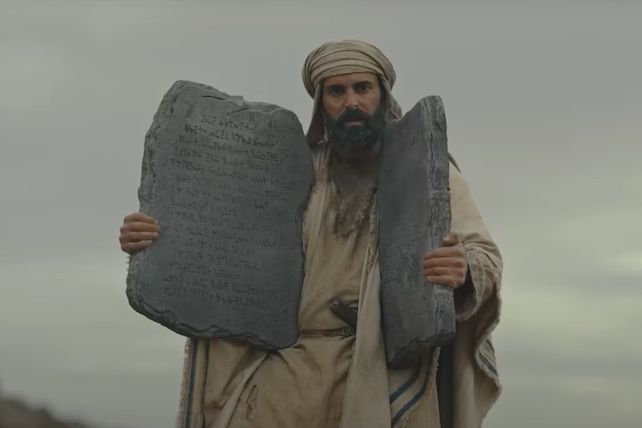How would you feel if God called you to confront the ruler of a land where you had committed murder? What would it be like, years later, to teach God’s people that one of his commands is, “You shall not murder”?
Could you live with the fact that as you were eating the first Passover meal in the land of Egypt, people outside the walls of your home are weeping over the deaths of their relatives at the hand of God?
Such are some of the questions posed in “Testament: The Story of Moses,” a new docuseries from Netflix released on Wednesday, March 27. The three-episode series, which essentially covers the story of Moses from his birth until shortly after he receives the 10 Commandments, is part drama, part interviews with experts. These experts offer their views on Moses’ life based on the Bible, Quran, and Midrash.
‘Testament: The Story of Moses’
“Anyone who has seen ‘The Ten Commandments’ as a child was well aware of the more epic elements of the tale,” said docuseries producers Emre Sahin and Kelly McPherson. “The burning bush, the plagues, Passover, the Red Sea, and, of course, the Ten Commandments. What really drew us in was the mystery of Moses’ inner life, his struggles with his own identity, his self-doubt, his humanness.”
RELATED: Worship Pastor’s ‘Got Some Grit’ and Receives Golden Ticket on ‘American Idol’
The docuseries is directed by Benjamin Ross and stars Avi Azulay as Moses, Mehmet Kurtulus as Pharaoh, and Dominique Jade Tipper as Zipporah. Charles Dance narrates, often quoting passages of the Bible to reference what is being dramatized in a particular scene.
A variety of experts from Jewish, Muslim and Christian backgrounds offer insights into the story of Moses and its applications for us today. At the beginning of the docuseries, the producers state:
This series is a dramatic exploration of the story of Moses and the Exodus, incorporating the views of theologians and historians from various faith and cultural backgrounds. Their contribution is meant to enrich the narrative, but should not be understood as consensus.
Some Christians might take issue with a few of the decisions in the docuseries. For example, some parts of the timeline are changed. In the show, Moses’ hand turns leprous when he first encounters Pharaoh in Egypt, rather than as a sign when Moses meets God at the burning bush.
Instead of God becoming angry and allowing Moses’ brother Aaron to be his mouthpiece as a concession to Moses’ repeated excuses, in the docuseries God calmly suggests Aaron help after Moses says he is not a good speaker. This is apparently a nod to how the Quran portrays this part of the story. This encounter with God is also depicted in the series as the first time Moses learns that he has a brother.

